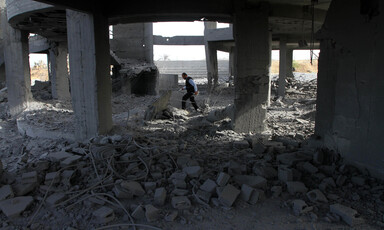
Backlash against boycotting Israel's universities reeks of hypocrisy
New York 17 January 2014
Supporters of Israeli apartheid feign concern for the oppressed. Read more about Backlash against boycotting Israel's universities reeks of hypocrisy

New York 17 January 2014
Supporters of Israeli apartheid feign concern for the oppressed. Read more about Backlash against boycotting Israel's universities reeks of hypocrisy

New York 16 July 2012
The underlying objectives to schemes inviting US university officials on a tour of Israel are to dissimulate legitimate criticism of Israeli policy and to discourage Palestinian solidarity on campuses. Read more about US university chiefs' shameful embrace of Israel

New York, United States 28 July 2006
I was invited to teach at an art workshop, so yesterday I went. I gave a lecture in the morning and then in the afternoon I was asked to give the students an assignment that they could do in two hours. I decided to print emails from my inbox from the last two weeks. I also printed out the article about the Americans rushing bombs to Israel and spoke about the absurdity of the question Americans ask about wether to get involved or not when they are 100 percent involved! I gave each student a different email, and a copy of the article, and told them to go out into the streets and do something in the public sphere based on their interaction, (or reaction) or whatever with the emails. Read more about Ali La Pointe and Zena's words on the New York streets

New York, United States 28 July 2006
“The paramount mood of Beirut in late-June 2006 was the hustle bustle of a thriving cosmopolis. Ours was a privileged perspective — two foreigners familiar with the pulse of the neighborhood, embraced and welcomed by a constellation of friends and acquaintances, comrades and colleagues… Beirut was thriving. Lebanon could have been a model of productive ideological conflicts, of civil discourse, progressive politics, foreign investments, domestic contestations, intellectual diversity, moral variations. Beirut was civil, civilizing, cosmopolitan.” In part one of a two-part series, Professor Hamid Dabashi reflects on the beauty of a country reduced to rubble by the Israelis and into two dimensions by the news media. Read more about How Do we Sleep While Beirut is Burning?

New York, United States 17 July 2006
Residents of our village are leaving for fear of running out of food; water is scarce and there are only four small grocery stores for a population of about 15,000 people. This is common throughout the South, as most depend on the cities for commerce (cities they are now cut off from). My grandmother and aunt have left the safety of our family’s bomb shelter to stay in a village on the coast. What appalling choices they have been given — seeking refuge in a building with no bomb shelter, in closer proximity to Israeli war ships, or remaining in a village where food is running out. The death toll in Lebanon is now 150 civilians, with the number of injured rising to 350. Read more about Israel's latest attack on the poor
1 August 2002
The U.N. report on events in Jenin is seriously flawed, Human Rights Watch said today. The report, mandated by a U.N. General Assembly resolution after Israeli objections forced the Secretary-General to disband a U.N. fact-finding team, largely limits itself to presenting competing accounts of the events during the Israeli military operations. Read more about U.N. Jenin Report 'Flawed'
New York 17 September 2001
I arrived in New York City on Friday night, three days after the disaster. I drove all day from Chicago with a friend. Read more about Thoughts from New York
13 August 2002
On August 11, Gideon Levy, of the Israeli daily Ha’aretz, his photographer, Miki Kratsman, their driver, and a representative from an international human rights organization were traveling by taxi in Tulkarem. As they approached the IDF’s District Coordination Office (DCO) at about 15 kph, they came under fire from a soldier at a lookout post about 150 meters away. Read more about Israeli journalists come under fire
21 June 2001
The Committee to Protect Journalists (CPJ) today released its latest research into the cases of journalists wounded by Israeli gunfire while covering unrest in the West Bank and Gaza Strip since last September. Read more about Research on shootings of journalists in Israel and the Occupied Territories
21 January 2002
The Committee to Protect Journalists (CPJ) condemns in the strongest terms Israel’s destruction today of the Palestinian Broadcasting Corporation building in the West Bank city of Ramallah. Read more about Israel destroys Palestinian radio and television building